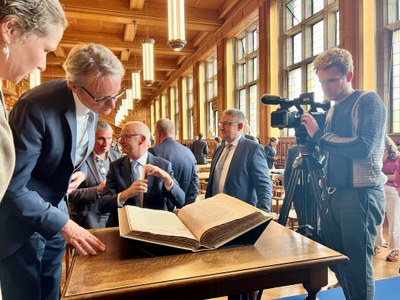KU Leuven and Flemish Community Unveil Special Second Edition of De Humani Corporis Fabrica
The masterpiece De Humani Corporis Fabrica by Andreas Vesalius, with personal notes by the author himself, is ‘at home’ in Leuven, the place where Vesalius studied and honed his knowledge of human anatomy. Today, Rector Luc Sels and Prime Minister Jan Jambon officially presented the exceptional copy of the second edition of the Fabrica. KU Leuven and the Flemish community purchased the Magnum Opus by Vesalius in February 2024 from the international auction house Christie’s.
Andries van Wesele, better known as Andreas Vesalius, laid the foundation for modern medical science and is also known as the father of modern anatomy. His masterpiece, De Humani Corporis Fabrica , or the Fabrica, is perhaps the most influential medical book ever published. In the Fabrica, Vesalius described human anatomy based on dissections he performed.
The Fabrica is more than a scientific masterpiece. It is also a real work of art. Vesalius collaborated with top artists to depict human anatomy with exceptional precision. These illustrators not only managed to capture anatomical details realistically, but also elevated the human body to an aesthetic ideal, a pinnacle of creation. This work marks the starting point of modern anatomical science and remains a monument in medical literature.
Hilde Van Kiel, director of KU Leuven Libraries
Rector Luc Sels emphasized the importance of this return: ” The Humani Corporis Fabrica compiled for the first time a real anatomy of the human body. It was a revolutionary work, which is rightly compared to the work of Copernicus, which was published in the same year (1543 ) appeared. Just as Copernicus overturned the concept of space, Vesalius renewed the concept of the body. This edition of the Fabrica will undoubtedly also be a source for innovative research also illustrates the great importance that KU Leuven attaches to academic heritage. With great thanks to Prime Minister Jan Jambon and the Flemish Government, because thanks to their support in the context of the Flemish masterpieces policy, we were able to bring this edition to KU Leuven.”
Jan Jambon, Flemish Prime Minister and Minister of Culture says: “During this administrative period we paid a lot of attention to heritage. Thanks to a catch-up process, we have financially strengthened the masterpieces fund by 1 million euros annually and we have renewed the masterpieces policy thanks to the right of pre-emption, the payment of the inheritance tax with cultural goods and the indemnity scheme for exhibitions. It is unique that we can add this Fabrica with annotations by Vesalius to the Flemish collection. This work is not only important because of its revolutionary medical insights, but it also provides insight into the medical practices of the time and the perfectionism of Vesalius.

